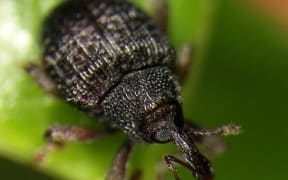Hundreds of Chilean weevils will be released in Southland in an effort to control widespread weed Darwin's barberry, which scientists say could become as big a problem as gorse.
About 100 barberry seed weevils were released for the first time in New Zealand last March to try to control Darwin's barberry.
Landcare Research imported the weevils and conducted extensive tests to make sure they were safe before they were released in Southland.
Landcare Research weed biocontrol group member Hugh Gourlay said the fast-spreading, orange-flowered thorny shrub was a growing problem in parts of the country, particularly Southland.
"It [Darwin's barberry] was an ornamental plant imported and put into people's gardens and then escaped from there," he said.
"We did make a release of weevils last year in Southland. Unfortunately it was quite small numbers - we were hoping for much larger numbers but weren't successful in rearing that many last year."
In most cases biological control agents could have an impact within 20 years but it could take as long as 150 years in this case, he said.
"In terms of plants like Darwin's barberry and other shrubby plants like this, they have a lot of resources available to them to be able to sustain impact and effects from insects.
"So it may take 50 years, 100 years or maybe even 150 years before you will actually see a significant reduction in the presence of the plant in our environment through the impacts of biological control."



